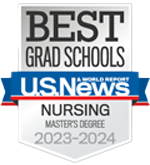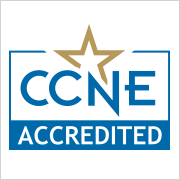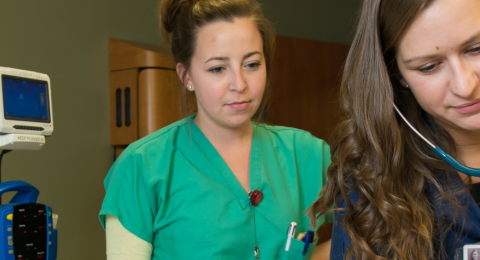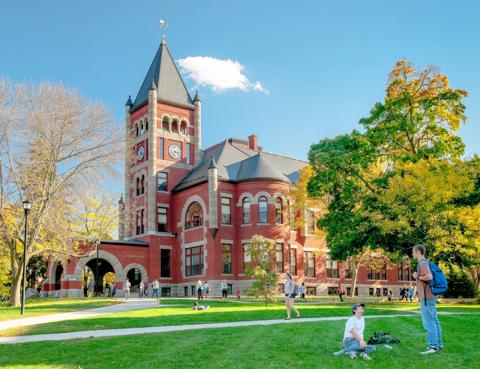The online Master of Science in Nursing Family Nurse Practitioner (MS FNP) program at UNH is designed for nurses seeking a hands-on role in family-oriented care. Our state-of-the-art Health Sciences Simulation Center provides experience in a clinical setting with real equipment and technology.
Credit Hours: 52 | Program Length: 27 Months (2 years 2 months) | Tuition Cost
Program credits and completion date vary based on individual student's academic schedule
Why get a Master's degree in Nursing: Primary Care Family Nurse Practitioner?
The master of science in nursing: primary care family nurse practitioner degree is designed for those who wish to advance their nursing career and provide comprehensive primary care for children and adults across the lifespan. You’ll learn a family-oriented approach that emphasizes health promotion, maintenance and restoration. You’ll combine theory, research and evidence-based practice to develop skills in advanced health assessment, illness and disease management, pathophysiology, pharmacology, epidemiology, and population health and risk reduction. You’ll complete your degree with a practicum in family primary care, and successful completion will qualify you to sit for the family nurse practitioner certification examination.
Why choose UNH's M.S. in Nursing: Primary Care Family Nurse Practitioner Program?
At UNH you’ll be supported by a productive faculty and outstanding facilities as you advance your nursing career. Faculty members conduct research in family-based health issues such as women’s health, health promotion for children and adolescents, and nursing care for the elderly.
Potential Career Areas
- Primary care clinics
- Correctional facilities
- Government health services
- Home health agencies
- Hospitals
- Long-term care facilities
- Military
- Physicians’ offices
- Schools
- Workplace clinics
Curriculum & Requirements
Primary Care Family Nurse Practitioner
This program prepares family nurse practitioners (FNP) who are clinically competent and practice with cultural humility as advanced practiced registered nurse (APRN). FNPs provide patient centered health care to individuals, families, and communities across the life span. Clinical practice includes health promotion, disease prevention, teaching, counseling, chronic disease management and urgent care. At the completion of the program, students are eligible to sit for national certification as a family nurse practitioner. Upon licensure, FNPs may practice autonomously as well as in collaboration with other health professionals.
Admission Requirements
Applicants are required to have an unencumbered RN license in the United States, degree in nursing or outside nursing, and successful completion of undergraduate statistics and research to be eligible to apply to this program.
- Unencumbered, active RN license in the United States
- Baccalaureate degree in nursing or another field
- Cumulative GPA of 3.2 or higher in associate and baccalaureate programs
- Minimum one year nursing experience preferred.
- Successful completion of undergraduate statistics course and undergraduate research course
- 3 letters of recommendation. Recommendation letters submitted by relatives or friends, as well as letters older than one year, will not be accepted. References should be substantial with one academic, if available, and two current nursing professionals with graduate education background.
- Personal Statement. Prepare a brief but careful statement regarding:
- Reasons you wish to do graduate work in this field, including your immediate and long-range objectives.
- our specific research or professional interest and experiences in this field.
Non-BSN Admission Requirements: RNs whose baccalaureate degree is in a discipline other than nursing may apply to the master of science degree in nursing (M.S.) program and will be considered for the track that is commensurate with their clinical experience based on faculty discretion.
Degree Requirements
Clinical Hours: 750*
| Code | Title | Credits |
|---|---|---|
| Required Courses | ||
| NURS 818 | Foundations of Evidence Based Practice | 3 |
| NURS 969 | Health Systems Policy, Economics & Financial Planning | 3 |
| NURS 816 | Health Promotion Theory and Population Health | 3 |
| NURS 915 | Leadership, Role & Collaboration | 3 |
| NURS 910 | Genomics & Ethics | 3 |
| NURS 917 | Biostats and Epidemiology | 3 |
| NURS 820 | Advanced Physiology and Pathophysiology Across the Lifespan | 3 |
| NURS 812 | Advanced Pharmacology and Therapeutics | 3 |
| NURS 814 | Advanced Health Assessment Across the Lifespan | 3 |
| NURS 911 | Diagnosis & Management - Diagnostic Reasoning | 3 |
| NURS 920 | FNP Health Management I - Didactic | 3 |
| NURS 921 | FNP Health Management I - Clinical | 4 |
| NURS 922 | FNP Health Management II - Didactic | 3 |
| NURS 923 | FNP Health Management II - Clinical | 4 |
| NURS 924 | FNP Health Management III - Didactic | 3 |
| NURS 940 | FNP Health Management III - Clinical | 4 |
| Total Credits | 51 | |
- *
Clinical hours are completed through the following required courses: NURS 921, NURS 923, NURS 940.
Program Learning Outcomes
The Family Nurse Practitioner builds upon the skills of the baccalaureate prepared generalist nurse.
At the completion of the Master's nursing program, the graduate student is prepared to:
- Serve in a healthcare leadership and change agent role as part of a diverse, complex, and patient-centered health care system.
- Act as a practice scholar to design, direct and evaluate system changes to promote safe, timely, effective, efficient, equitable and patient-centered care.
- Use data analytic methods, information systems and technology to evaluate, integrate and apply knowledge that will improve programs of care, outcomes of care and care systems.
- Use translational science and analytic methods to develop, identify, implement, and evaluate best practices to improve health care and health care systems.
- Design and implement health promotion and clinical prevention strategies across the health/illness continuum to optimize health and disease management.
- Systematically use improvement methods to monitor and evaluate care processes and outcomes and applies data for continuous improvement and safety
- Advocate for social justice through policy, professional and political engagement.
- Applies leadership principles that support inter-professional practice.
In addition to the Master's Outcomes above, the Primary Care Family Nurse Practitioner graduate will:
- Utilize advanced assessment, diagnostic reasoning, and evidence-based practice when partnering with individuals, families, and communities to optimize health
- Judiciously prescribe treatment modalities to manage acute and chronic conditions within state and federal scope of practice regulations
- Function as an independent practitioner to manage comprehensive primary care across the lifespan.
Professional Licensure/Certification Disclosures
The University of New Hampshire offers a number of academic programs designed to lead to professional licensure or certification in New Hampshire. However, completing a UNH degree/program does not guarantee professional licensure or certification. Eligibility may also depend on factors like years of work experience, professional examinations, passing a background check, and other criteria.
UNH does not guarantee that its professional licensure programs will satisfy the criteria of professional licensure boards in other states. Some states maintain different requirements for professional licensure or certification and requirements can change frequently. Federal regulations require the University to make public disclosure of certain information regarding professional licensure or certification programs, regardless of the modality the program is offered (i.e., in-person or online). The University provides guidance below but recommends students contact their state/territory licensing or certification board to ensure a program meets specific state/territory requirements.
Visit the Office of the Registrar's website for information about whether this program meets professional licensure requirements in your state.
Deadlines
Applications must be completed by the following deadlines in order to be reviewed for admission:
- Fall: N/A
- Spring: Recommended August 1, Final Deadline if space available December 1
- Summer: N/A
- Special: N/A
Application fee: $65
Campus: Durham
New England Regional: No
Accelerated Masters Eligible: No
New Hampshire Residents
Students claiming in-state residency must also submit a Proof of Residence Form. This form is not required to complete your application, but you will need to submit it after you are offered admission, or you will not be able to register for classes.
Transcripts
If you attended UNH or Granite State College (GSC) after September 1, 1991, and have indicated so on your online application, we will retrieve your transcript internally; this includes UNH-Durham, UNH-Manchester, UNH Non-Degree work and GSC.
If you did not attend UNH, or attended prior to September 1, 1991, then you must upload a copy (PDF) of your transcript in the application form. International transcripts must be translated into English.
If admitted, you must then request an official transcript be sent directly to our office from the Registrar's Office of each college/university attended. We accept transcripts both electronically and in hard copy:
- Electronic Transcripts: Please have your institution send the transcript directly to grad.school@unh.edu. Please note that we can only accept copies sent directly from the institution.
- Paper Transcripts: Please send hard copies of transcripts to: UNH Graduate School, Thompson Hall- 105 Main Street, Durham, NH 03824. You may request transcripts be sent to us directly from the institution or you may send them yourself as long as they remain sealed in the original university envelope.
Transcripts from all previous post-secondary institutions must be submitted and applicants must disclose any previous academic or disciplinary sanctions that resulted in their temporary or permanent separation from a previous post-secondary institution. If it is found that previous academic or disciplinary separations were not disclosed, applicants may face denial and admitted students may face dismissal from their academic program.
Letters of recommendation: 3 required
Recommendation letters submitted by relatives or friends, as well as letters older than one year, will not be accepted.
References should be substantial with one academic, if available, and two current nursing professionals with graduate education background.
Personal Statement/Essay Questions
Prepare a brief but careful statement regarding:
- Reasons you wish to do graduate work in this field, including your immediate and long-range objectives.
- Your specific research or professional interest and experiences in this field.
Additional Department Requirements
Applicants are required to have an unencumbered RN license in the United States, degree in nursing or outside nursing, and successful completion of undergraduate statistics and research to be eligible to apply to this program.
Non-BSN Admission Requirements:
RNs whose baccalaureate degree is in a discipline other than nursing may apply to the master of science degree in nursing (M.S.) program and will be considered for the track that is commensurate with their clinical experience based on faculty discretion.
- Unencumbered, active RN license in the United States
- Baccalaureate degree in another field
- Cumulative GPA of 3.2 or higher in associate and baccalaureate programs
- Nursing experience preferred but not required
- Successful completion of undergraduate statistics course and undergraduate research course
- Interview may be requested
Resume
A current resume is required with your submitted application.
Important Notes
All applicants are encouraged to contact programs directly to discuss program-specific application questions.
International Applicants
Prospective international students are required to submit TOEFL, IELTS, or equivalent examination scores. English Language Exams may be waived if English is your first language. If you wish to request a waiver, then please visit our Test Scores webpage for more information.

Advance your nursing career with a top-ranked nursing degree from the University of New Hampshire.

UNH's Nursing Department is nationally accredited by the Commission on Collegiate Nursing Education.
Explore Program Details
Tuition & Fees:
The University of New Hampshire’s online graduate tuition and fees information is available on the UNH Student Accounts Website. Program costs and technology fees are subject to change.
Course Fees: Specific courses may have additional course fees. Visit the course schedule for more information.
Financial Aid:
Federal Unsubsidized Direct Loans are a form of federal financial aid available to Graduate Students. To apply, you must complete the Free Application for Federal Student Aid (FAFSA).



